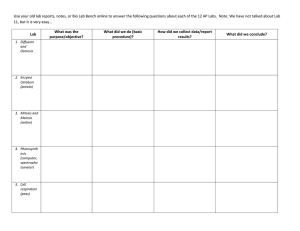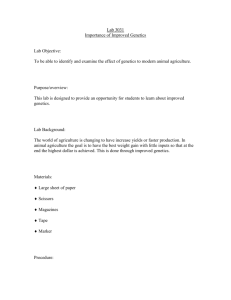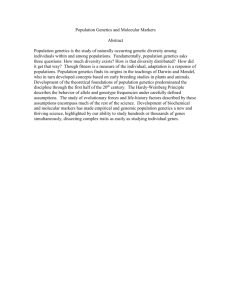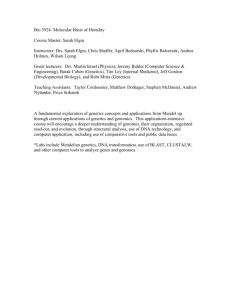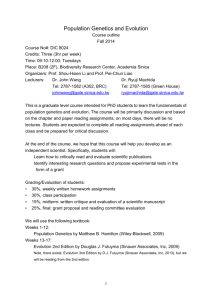Use to propose new general education courses (except writing courses),... gen ed courses and to remove designations for existing gen...
advertisement
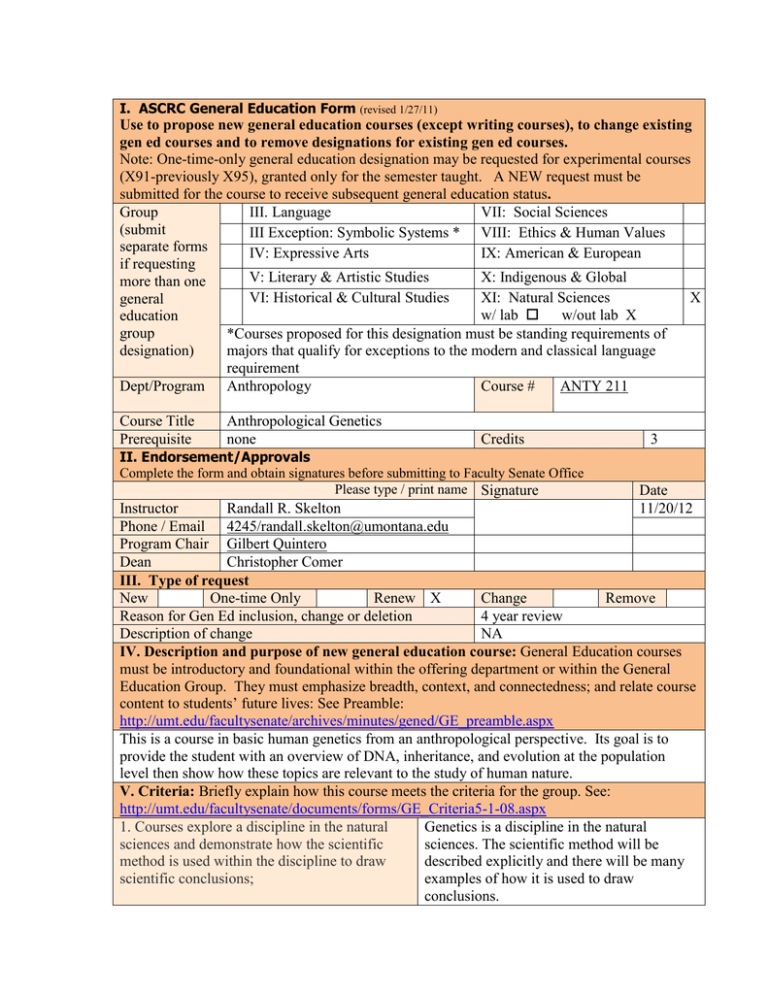
I. ASCRC General Education Form (revised 1/27/11) Use to propose new general education courses (except writing courses), to change existing gen ed courses and to remove designations for existing gen ed courses. Note: One-time-only general education designation may be requested for experimental courses (X91-previously X95), granted only for the semester taught. A NEW request must be submitted for the course to receive subsequent general education status. Group III. Language VII: Social Sciences (submit III Exception: Symbolic Systems * VIII: Ethics & Human Values separate forms IV: Expressive Arts IX: American & European if requesting V: Literary & Artistic Studies X: Indigenous & Global more than one VI: Historical & Cultural Studies XI: Natural Sciences X general w/ lab w/out lab X education group *Courses proposed for this designation must be standing requirements of designation) majors that qualify for exceptions to the modern and classical language requirement Dept/Program Anthropology Course # ANTY 211 Course Title Prerequisite Anthropological Genetics none Credits II. Endorsement/Approvals Complete the form and obtain signatures before submitting to Faculty Senate Office Please type / print name Signature 3 Date 11/20/12 Instructor Randall R. Skelton Phone / Email 4245/randall.skelton@umontana.edu Program Chair Gilbert Quintero Dean Christopher Comer III. Type of request New One-time Only Renew X Change Remove Reason for Gen Ed inclusion, change or deletion 4 year review Description of change NA IV. Description and purpose of new general education course: General Education courses must be introductory and foundational within the offering department or within the General Education Group. They must emphasize breadth, context, and connectedness; and relate course content to students’ future lives: See Preamble: http://umt.edu/facultysenate/archives/minutes/gened/GE_preamble.aspx This is a course in basic human genetics from an anthropological perspective. Its goal is to provide the student with an overview of DNA, inheritance, and evolution at the population level then show how these topics are relevant to the study of human nature. V. Criteria: Briefly explain how this course meets the criteria for the group. See: http://umt.edu/facultysenate/documents/forms/GE_Criteria5-1-08.aspx 1. Courses explore a discipline in the natural Genetics is a discipline in the natural sciences and demonstrate how the scientific sciences. The scientific method will be method is used within the discipline to draw described explicitly and there will be many scientific conclusions; examples of how it is used to draw conclusions. 2. Courses address the concept of analytic uncertainty and the rigorous process required to take an idea to a hypothesis and then to a validated scientific theory; Statistical testing of certain types of hypotheses will be presented. Inevitably, there will be some treatment of current debates in anthropological genetics and these will be opportunities to show how ideas progress from preliminary suggestions to consensus positions in the field. Not applicable – no lab. 3. Lab courses engage students in inquiry-based learning activities where they formulate a hypothesis, design an experiment to test the hypothesis, and collect, interpret, and present the data to support their conclusions. VI. Student Learning Goals: Briefly explain how this course will meet the applicable learning goals. See: http://umt.edu/facultysenate/documents/forms/GE_Criteria5-1-08.aspx 1. understand the general principles associated Readings and assignments will be used to with the discipline(s) studied; guide the students into understanding the general principles of anthropological genetics. 2. understand the methodology and activities Readings and assignments will be used to scientists use to gather, validate and interpret help the students understand the data related to natural processes; methodology and activities that scientists use to gather, validate and interpret data related to natural processes. 3. detect patterns, draw conclusions, develop Many aspects of anthropological genetics, conjectures and hypotheses, and test them by especially the evolutionary mechanisms appropriate means and experiments; operating on populations involve detection of patterns. Readings and assignments will be used to help students to detect these patterns, formulate a hypothesis based upon them, and test the hypothesis against data and the history/archaeology of the population. 4. understand how scientific laws and theories Readings and assignments will be used to are verified by quantitative measurement, help the students understand how selected scientific observation, and logical/critical scientific theories were/are verified. reasoning; and There will be aspects of statistical testing. 5. understand the means by which analytic For example the chi-squared test for uncertainty is quantified and expressed in the whether a population is in Hardy-Weinberg natural sciences. equilibrium. VII. Justification: Normally, general education courses will not carry pre-requisites, will carry at least 3 credits, and will be numbered at the 100-200 level. If the course has more than one pre-requisite, carries fewer than three credits, or is upper division (numbered above the 200 level), provide rationale for exception(s). NA VIII. Syllabus: Paste syllabus below or attach and send digital copy with form. The syllabus should clearly describe how the above criteria are satisfied. For assistance on syllabus preparation see: http://teaching.berkeley.edu/bgd/syllabus.html Anthropology 211N: Human Genetics Summer Session II, 2011 Affiliate Instructor: Ryan W. Schmidt, PhD Candidate Department of Anthropology University of Montana Class Dates & Location: The online course runs from June 27, 2010 – July 29, 2010. It is taught online, through Moodle (http://umonline.umt.edu/). Contact Information: Phone: 702-274-7123 (mobile) Email: ryan2.schmidt@umontana.edu; or schmidtrw@gmail.com No Physical Office Hours: I will be teaching this course from Mongolia. Please use email to reach me. Virtual Office Hours in Bb: M, W, F: 12 – 2 Tech Support: UMOnline: 406.243.6367; or http://umonline.umt.edu (Contact Us tab) Course Overview: This online-based human genetics course is intended for nonbiology majors. We will cover the basic concepts of anthropological genetics including: the basic biological understanding of cell division, DNA structure, gene interaction, mutation and Mendelian inheritance; the use of DNA markers to understand human evolution; the fundamentals of population genetics and a population genetic perspective for reconstructing human origins; Target Student: Students who have enrolled in ANTH 211, Human Genetics are ultimately interested in what we can learn from genetics in an anthropological context. As a web-based course, you need to be self-motivated, be an efficient time manager, and actively seek out knowledge from your peers, myself, or resources found on the Web. We do not meet every week and therefore will need to keep up with the course material. Just like in a traditional classroom, please do not fall behind with your work. Prerequisite Skills and Knowledge: I assume you have some background in biology, chemistry and mathematics. As this course is intended for non-biology majors, we will not be as technical; however, you are going to be required to learn and memorize a variety of terms that you may not be familiar. The mathematics of population genetics will not be too difficult – simple addition, subtraction, multiplication and division. Course Importance and Relevance: In today’s society, the discussion of genetics is becoming more mainstream, but at the same time, more complex. In this course, you will understand key concepts, principles, and processes that are central to the study of human genetics; in addition to cultivating a greater recognition of the larger ethical, familial, and social processes in the complex world of human genetics. After completing this course, you will have the requisite tools and knowledge to appreciate human genetic complexities, whether in the classroom, the front page of the newspaper, or found in social networking sites like Facebook and Twitter. Expected Student Learning Outcomes: Learning Outcomes: Assessments: 1. Understand the structure of the cell, cell division, Mendelian inheritance, and the nature of chromosomes. Learning Units 1-3: This includes presentations from the text, text-based readings, web-based resources, assignment 1 and 2, and exam 1. 2. Learn the basics of DNA, protein synthesis, amino acids, and mutation. Learning Unit 4. Includes assignments 3 and 4, exam 2, lectures, readings, electronic resources (web and textbook). 3. Understand the fundamentals of population genetics, human biological variation and the use of race as a biological construct. Learning Unit 5. Readings, lectures, assignment 5, Exam 3. Participation and Grading Criteria: Participation Expectations: No class meetings will be held in a classroom, so attendance is irrelevant. However, continuous progress in the class is required. All students are required to be present and visible each week throughout the semester. This means spending time on Blackboard to go over the presentation material and access web-based resources. Assignments and Assessments: During the summer session there will be Three (3) multiple choice, T/F and fill-in-the-blank exams (100 points each; weighed 25% each). Five(5) assignments (20 points each; weighted 5% each). There is an overall total of 400 points. There is a voluntary comprehensive exam. If you are unsatisfied with one of your first 3 exam grades, the final can substitute for your lowest score. Exam Schedule: Exam 1 (Chapters 1-6) – Due by 11:59 p.m. Sunday, July 17 Exam 2 (Chapters 8,9,11) – Due by 11:59 p.m. Sunday, July 24 Exam 3 (Chapter 19) – Due by 11:59 p.m. Thursday, July 28 Final Exam (optional) – Due by 11:59 p.m. Friday, July 29 Exams will consist of 50 questions (2 point per question). All exams will be available the week they are assigned and are timed. Please note that you will have two (2) hours to complete each exam. You will have four (4) hours to complete the final. The final exam consists of 100 questions, one point each. A few things to note when taking the quizzes and exams. All quizzes and exams are given online and are found in their own tab located on the left of the screen, called either “Quiz” or “Exam”. Questions are presented one at a time. DO NOT attempt to navigate out of the quiz and exam. If you do so, Blackboard will LOCK YOU OUT. When this happens, I have to go in and clear your attempt. Let me be more clear. If you accidentally hit the “Back” button in your browser, it will lock you out, even if you have completed 49 of 50 questions. Also, if you become locked out, I generally cannot see your completed answers, requiring you to take the quiz or exam from the beginning. Grading Scale: You can expect your final grade to be assigned using the following scale: A = 90% and up, B = 80-89%, C = 60-79%, D = 60-51%, F = 50% or less. Course Textbook Michael Cummings Human Heredity: Principles and Issues, 9th Edition (2010) ISBN-13: 978-0-538-49882-1 Course Policies and Procedures: Email Addresses: For all correspondence I will use your official University of Montana email address. If you do not know how to access your official University email instructions can be found at http://www.umt.edu/it/support/email/. If you are like me, checking your University email is more pain than it is worth. If you want to forward your UMConnect to an off-campus address, this is fine, but please make a note that ALL correspondence will be through your .edu account. This is important because I will be making frequent announcements through Blackboard and these get forwarded onto your UMConnect email. So check often. Class Materials: The class materials are on the Moodle system. You should have been notified by email about how to access this system. If not, contact me immediately. All materials for successful completion of the class are on the Moodle system. Late Assignments Policy: Each of your assignments has a specific time for when it is available and when it becomes unavailable. Because of this, late assignments will not be accepted. The only exception to this policy is in the case of extreme illness and you are not able to complete the assignment. In this case, you must notify me immediately of your sickness and we will work out a time for you to take the exam. Academic Integrity: Students will be held to the provisions of the Student Conduct Code, online at http://life.umt.edu/VPSA/name/StudentConductCode, with regards to cheating, plagiarism, abusive language, and other issues. Violations will not be tolerated. Disabilities: Every effort has been made to make the online materials accessible to students with disabilities. If you have a problem accessing the materials, you should let your instructor know what accommodation you need. I assume that accommodation services and facilities will be provided by the Disability Services for Students office (see http://www.umt.edu/dss/). Technical Requirements: As this is a strictly web-based course, you will obviously need to have some technical requirements such as downloads or plug-ins. This web page lists those that may be required to complete the course: http://umonline.umt.edu/StudentInfo/plugins.htm [Note that the menu of your Bb course site, by default, includes a link to Technical Support for your students.] Readiness for Online Learning: If this is your first course in your program’s sequence or a lower division course, you may want to refer to the Blackboard tutorial (see http://umonline.umt.edu/StudentInfo/ for details). You can also go to a “readiness for online learning” assessment from that same web page. Course Syllabus Week Learning Unit Topics Covered Readings Introduction to Genetics Cells & Cell Division 1 1 June 27 – July 3 Chapters 1-3 Transmission of genes from generation to generation (Mendel) Assignment 1 due by 11:59 p.m. Sunday, July 3 Units 1: covers chapters 1-3 Pedigree Analysis in Human Genetics 2 July 4 – 10 2 Interaction of Genes and the Environment Assignment 2 due Unit 2: covers chapters 4 and 5 Chapters 4 and 5 Human Chromosomes: Cytogenetics Assignment 3 Due 3 3 July 11 - 17 Exam 1 due by 11:59 p.m. Sunday July 18 Units 1 – 3: covers chapters 1-6. DNA Structure and Chromosome Organization Gene Expression: from genes to proteins 4 Assignment 4 Due 4 Mutation Exam 2 Due: 11: 59 p.m. July 25 Covers Chapters 8, 9, and 11. July 18 – 24 Assign 3 due by 11:59 pm Thursday July 14 Chapter 6 Chapters 8, 9, and 11 Assign 4 due by Thursday July 21 Exam 2 due by Sunday July 24th. Population Genetics and Human Evolution 5 July 25 - 29 5 Exam 3 Due 11:59 p.m. Friday July 29: Covers only chapter 19. Assign 5 due by Wednesday July 27th: Chapter 19 Please note: Approved general education changes will take effect next fall. General education instructors will be expected to provide sample assessment items and corresponding responses to the Assessment Advisory Committee.

